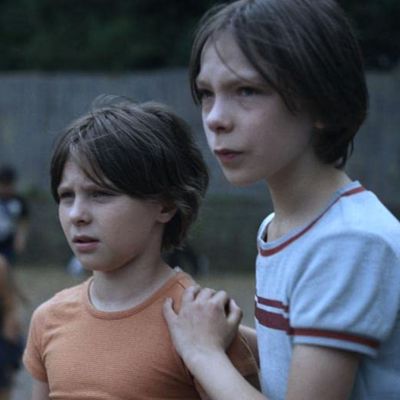
Playground begins and ends with an embrace, but between those two instances of tenderness lies a nerve-shredding 72-minute drama set in the guilelessly cruel world of young children. There have been lots of movies about bullying, but I’m not sure I’ve ever seen one like Laura Wandel’s, which is shot, cut, and performed with an immediacy that puts us inside the queasy, terrified mind of a 7-year-old girl. Opening in theaters this week, Playground was Belgium’s submission for this year’s Academy Awards, and it was shortlisted but not nominated. Don’t let that stop you from seeing it.
When we first meet Nora (Maya Vanderbeque), she’s in tears, being comforted by her brother, Abel (Günter Duret), as she prepares to start her first day of school. He gently assures her that she’ll soon make friends and everything will be fine. Abel is a bit older than Nora, yet the two constantly run into each other during recess and lunch. On the playground, Abel joins in with older kids to torment newcomers, but his attempts to protect Nora from his pals’ taunts backfire, and he himself becomes the target of the school bullies. When Nora tells their father of her brother’s ordeal, Abel turns on her; parental intervention winds up merely accelerating the other kids’ cruelty.
As brother and sister grow apart, they start to switch places. A wounded, hardened Nora begins lashing out at the world around her, while the increasingly fragile Abel becomes everyone’s victim — beaten, mocked, avoided. This cycle of abuse, growing ever more byzantine and sadistic, becomes part of the daily ritual at school: Mixed in with swim class, gym class, and homeroom are the inevitable recess beatdowns and lunchtime humiliations.
Playground is bleak, bleak stuff. It’s also electrifying. Wandel, making her first feature, keeps her camera low and mobile, following close behind Nora as she navigates the playground, the classroom, the bathrooms, and the corridors. The film’s child’s-eye perspective is so relentless we almost never see a parent or teacher’s face unless they’re leaning down or sitting at Nora’s level — a striking visual correlative to the general helplessness of the adults around her.
Such bold aesthetic choices pay off across a whole spectrum of emotions. Combined with Nora’s already small stature — she seems even shorter than the other kids around her — the low, close camera renders her uniquely vulnerable but also hard to reach. And by limiting her (and our) vision, this visual approach ensures that some of Playground plays out like a horror movie; we never quite know what’s lurking around the next corner or what new menace might be beyond the edges of the frame. (And, much as with horror, the sound design has to do double duty, hinting at the terrors being enacted on these kids without always showing what’s happening.) Wandel was once mentored by the legendary filmmaker and fellow Belgian Luc Dardenne, and she’s learned well one of the key lessons of the Dardenne brothers’ body of work, which is that if one hews close enough to the characters’ perspectives, every story effectively becomes a thriller.
As Nora, Vanderbeque is quite stunning from the film’s first heartbreaking frame to its last. She has to be alternately terrified, curious, strident, angry, disaffected, vengeful, and at times even possessed. It’s a testament to this impossibly young actress’s talent that she can convey all these emotional shifts without it ever seeming convenient, phony, or cheap. The moral and emotional trap Nora finds herself in feels organic, perhaps because many of us will recognize it from our own lives. Playground is a tough watch, but it’s also an essential one.
More Movie Reviews
- The Accountant 2 Can Not Be Taken Seriously
- Another Simple Favor Is So Fun, Until It Gets So Dumb
- Errol Morris Has Been Sucked Into the Gaping Maw of True Crime


